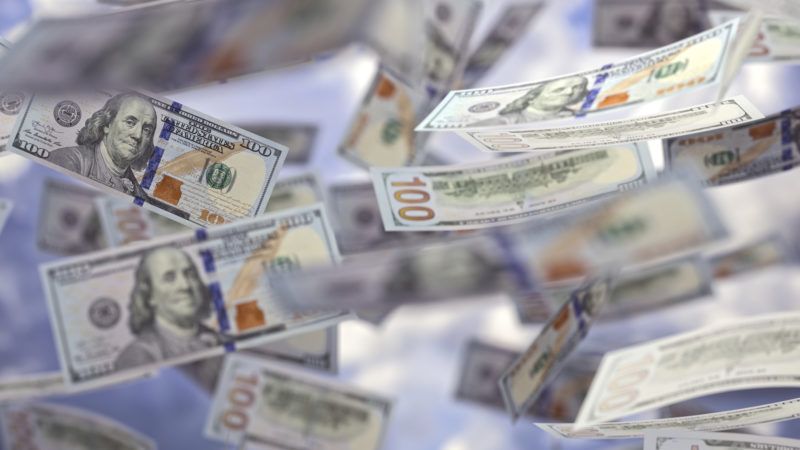No, Stimulus Spending Wouldn't Be an Economic Vaccine Against the Coronavirus
If it works at all (and it usually doesn't), a fiscal stimulus is meant to boost demand. The biggest potential economic problem from coronavirus has to do with supply.

With markets tumbling and confirmed cases of coronavirus rising, President Donald Trump is reportedly considering a fiscal stimulus plan. Already the president has urged Congress to pass a payroll tax cut and said the Federal Reserve should cut interest rates beyond what it already has done.
Others are pushing for even more aggressive actions. In an op-ed published Thursday in The Wall Street Journal, Jason Furman argues that Congress should "swiftly" pass a $350 billion stimulus to counter the "mounting economic risks posed by the spread of the novel coronavirus." While Trump has considered a temporary payroll tax cut to boost the economy, Furman, a former economic advisor to President Barack Obama, prefers straight cash. "Congress should pass a simple one-time payment of $1,000 to every adult who is a U.S. citizen or a taxpaying U.S. resident, and $500 to every child," he argues—an amount that would be even more generous than the 2008 stimulus passed during the Bush administration.
There are at least three good reasons to question whether any economic stimulus would be a wise response to the coronavirus—over and above the obvious questions about the federal government's ability to finance a big stimulus while already running a $1 trillion annual budget deficit.
First, the severity of any economic shock caused by the coronavirus is still unknown.
Keep in mind that—despite the president's obsession with it—the stock market is not a gauge of the economy itself. It's a gauge of how people think the economy will be in the future. This week's sell-off reflects pessimism, but that's not the same as an actual economic shock. If the virus' impact ends up being less bad than expected, the stock market will recover the lost value.
So far, that unknown seems to be keeping the White House from doing anything too aggressive. In an interview with CNBC on Friday morning, the president's top economic advisor, Larry Kudlow, said the preference is for a "targeted approach" aimed at "individuals who might lose paychecks" and "small businesses that might get hurt" by the economic disruption expected to be caused by the outbreak. Of course, big businesses like airlines can be expected to have their hands out too if there is any talk of a coronavirus bailout.
Second, there's the time it would take for any economic stimulus to have an effect.
As Furman conceded, studies show that it takes as much as a full year for monetary policy stimulus—for example, the Fed lowering interest rates—to have a measurable effect on the economy. That's because lower interest rates encourage people and businesses to borrow money for big purchases (homes, new plants, etc.) but those decisions aren't made overnight.
If the timing of the crisis rules out monetary stimulus, then what about fiscal stimulus—sending a thousand bucks to every American? That may not work either, partly because of the nature of the disruption that's expected from the coronavirus and partly because of how fiscal stimulus works.
Most economists are worried about a supply-side shock—that is, a disruption in getting enough goods to market to meet demand. If China's factories are closed for a substantial period of time or ships are unable to travel from port to port for fear of spreading the disease, global supply chains will be disrupted. The economic effects of the virus are fundamentally different from those of, say, the 2008 recession. Most of the long-term effects of the recession were demand-side problems—not enough people buying houses, for example, or the general slackening in demand that comes when millions of people suddenly lose their jobs. In short, there were too many sellers and not enough buyers.
This is a different problem. If global supply chains are seriously disrupted, there will not be enough goods to sell and too many people wanting to buy. That's why you can't find hand sanitizer on Amazon right now.
That's the third problem with the stimulus idea. Putting more money in the pockets of every American, either by cutting payroll taxes or by mailing checks, would tend to juice the economy faster than cutting interest rates. But that assumes there are goods and services available for them to buy.
"You cannot buy stuff that does not exist," writes economist Tony Lima. And as he warns, dumping more cash into an economy experiencing a supply-side shock is likely to trigger inflation.
The good news is that history suggests supply-side disruptions tend to pass pretty quickly. Demand usually bounces back quickly too. "You get a V[-shaped recovery] because people now do the spending they didn't do the last quarter," Doug Holtz-Eakin, president of the conservative American Action Forum and former economic advisor to George W. Bush, tells New York.
In arguing for a stimulus, Furman compares it to the coronavirus vaccine that scientists are working to develop. "It would be nice if there existed a comparably targeted medicine for economic policymakers to administer," he writes.
Indeed it would. But as doctors will tell you, administering vaccines to patients with weakened immune systems can be disastrous. Given the United States' already perilous national debt and rising deficit, the White House and Congress should be cautious about spending additional money to avoid a coronavirus-caused recession—especially since the "vaccine" doesn't seem like a sure bet.


Show Comments (66)